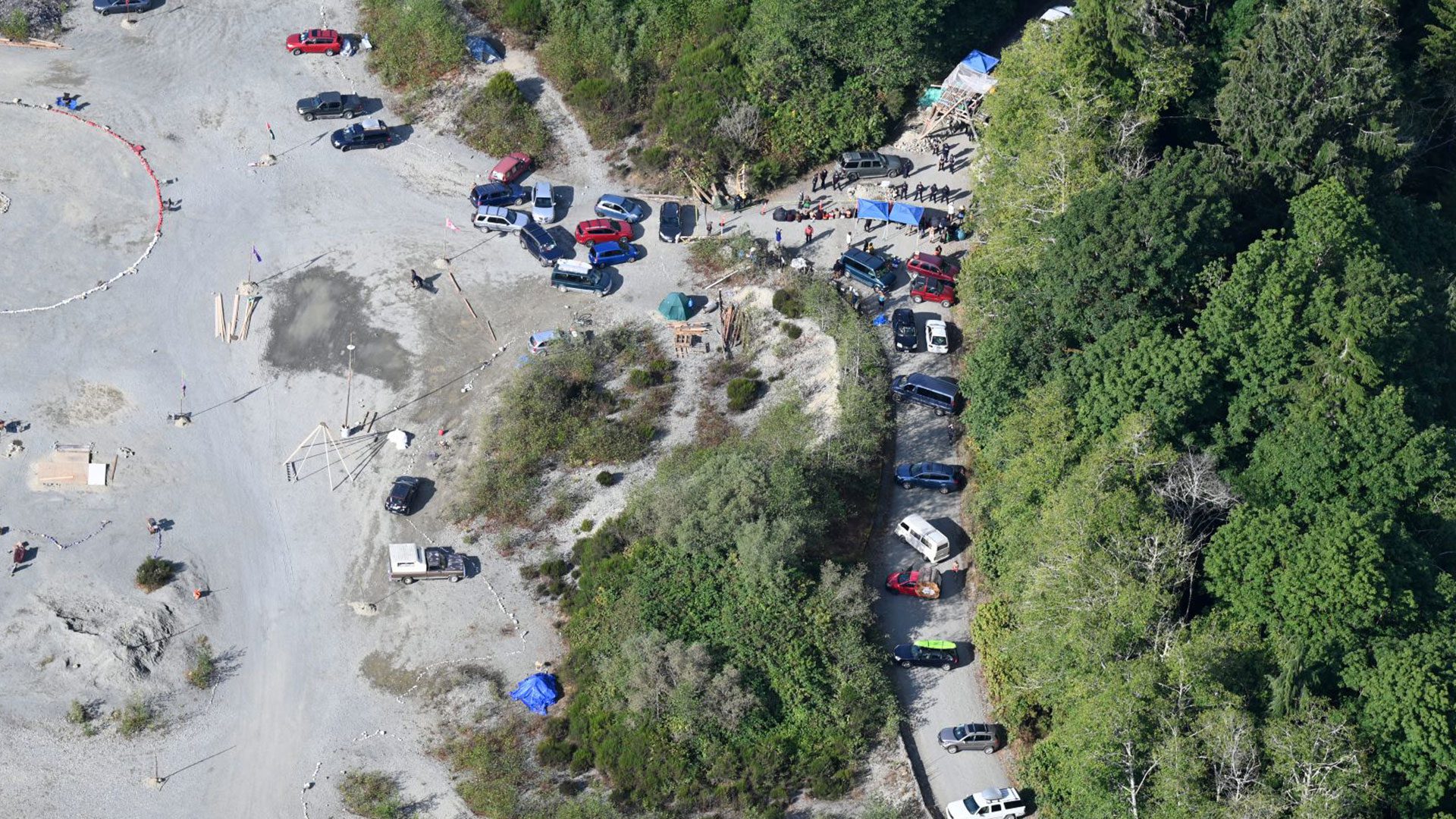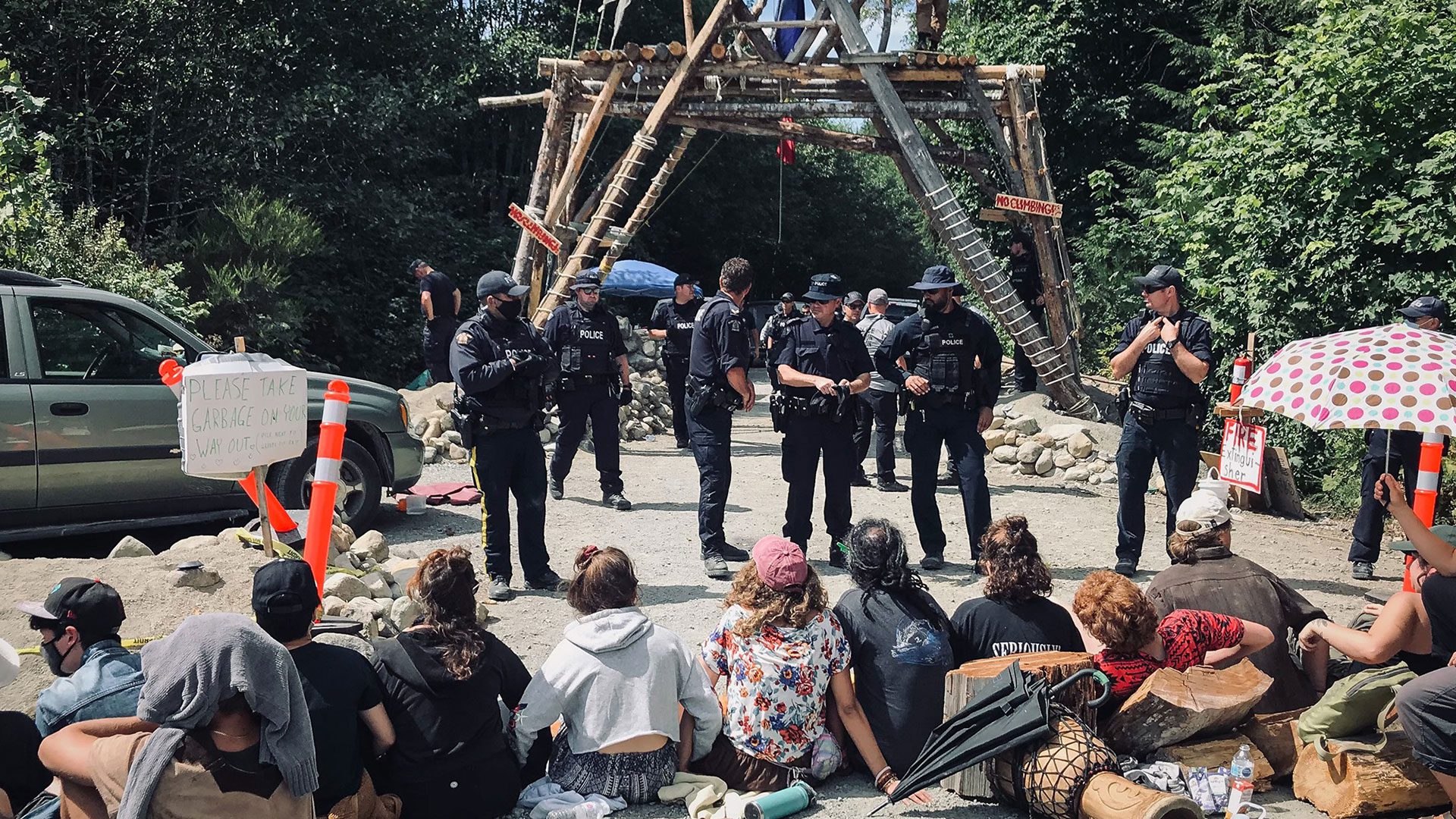More than 30 protestors were arrested at multiple camps near Fairy Creek in the disputed area over logging old-growth trees this week.
The logging dispute on Vancouver Island has lasted over a year, with more than 550 arrests for violating an injunction in a logging area.
RCMP officers arrived in green military fatigues on ATVs telling protestors on the logging road near Port Renfrew, B.C.
An unidentified officer notified the group that they are enforcing the injunction.
“I need you to step back; the injunction zone is going into effect here,” the officer can be heard in a social media video.
According to a police press release, 33 people were arrested on Aug. 9 at multiple camps.
In a phone interview with ATPN News, Rainforest Flying Squad spokesperson Saul Arbess said the original camp set up over a year ago had been raided on Monday.
He added that arrests were still taking place the next day.
“At the same time yesterday, they raided Helicamp, Helicamp is one of the camps up near the rim of Fairy Creek Proper, which has a deferral on it for the remainder of the two years,” he said.
The three camps where arrests took place were Headquarters, Helicamp and River Camp.
In August 2020, the Rainforest Flying Squad set up blockades to prevent old-growth trees from being logged in Fairy Creek.
On April 1, 2021, Teal-Jones was granted an injunction to operate in the Fairy Creek area.
The surrey based logging company had a revenue-sharing agreement with the Pacheedaht First Nation, and approved permits from the province.
Police enforcement started in mid-May with an injunction zone being established.

As of an Aug. 10 press release by RCMP, 579 arrests have been made in the Fairy Creek Watershed area.
Most arrests, 419, were for breaching the injunction and the other 132 for obstruction of justice.
According to RCMP, enforcement took place as vehicles, tents, and trenches were blocking the roadway, hindering loggers and police.
“The use of vehicles to block roadways is not only a breach of the court-ordered injunction but creates serious difficulties for the local Fire Department to access those roadways in the event of a forest fire,” the RCMP said in a press release.
The protests include non-indigenous and Indigenous supporters.
Arbess said a bond has grown as land defenders this past year.
“The solidarity between land defenders has only grown and become stronger, he said. “Its an incredible movement that involves all of our people.”
Thin Blue Line patches
The Rainforest flying squad stated in the months of arrests on Vancouver Island that certain people are being targeted.
“I can say consistently that police have targeted black, Indigenous and people of colour, BIPOC people when they are doing arrests, in particular-Indigenous youth,” said Arbess.
Arbess said the protestors have spotted police officers wearing “Thing Blue Line” patches.
The patch is symbolizing that the police stand between order and chaos.
It is often used in solidarity with the police and their families – but there are concerns the symbol has been associated with far right groups in Australia and the United States.
In October 2020, RCMP leadership told their officers that the patch was not approved to wear on the job, but National Police Federation, the union representing 20,000 Mounties pushed back.
RCMP spokesperson Sgt. Christopher Manseau responded to APTN in an email statement that no group is being targeted.
“The RCMP does not target any individual or group based solely on their racial, ethnic or religious background, and focuses on observed or suspected criminality and behaviours,” he said.
On the reports of officers wearing “Thin Blue Line” patches, Manseau pointed to the disagreement between leadership and the police union.
“We respect that the RCMP has issued guidance regarding the patch and we also understand the position of the RCMP union on this matter,” the statement read.
“We have notified the commanders for their awareness and have nothing further to add at this time.”

This June, the B.C. government put a two-year deferral of old-growth in Fairy Creek and Carmanah Walbran regions.
The deferral came after a request by three first nations, including the Pacheedaht First Nation, Fairy Creek falls in their traditional territory.
The protestors remained and have been calling for permanent protection of these regions.
Arbess pointed to this lack of protection uncertainty beyond two years and the government report was released in 2020.
“There is no guarantee; they are only deferrals,” he said. “The old-growth strategic review certainly called for the most critically endanger old-growth, and these areas both at Fairy Creek and Central Walbran certainly qualify.”
After a year of requests to the province, the Rainforest Flying Squad said they have not had any conversations with anyone in government.
Arbess said they plan to stay but are currently reaching out to Pacheedaht First Nation in hopes of ending this dispute peacefully.
“We are reaching out now and trying to bring that to some kind of an agreement that would allow us to leave but will also lead to some, the protection of those areas we have been defending all this time,” he said.
APTN reached out to Pacheedaht First Nation but did not get a comment for this story.










